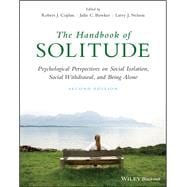
The Handbook of Solitude Psychological Perspectives on Social Isolation, Social Withdrawal, and Being Alone
by Coplan, Robert J.; Bowker, Julie C.; Nelson, Larry J.Buy New
Rent Textbook
Rent Digital
Downloadable: Lifetime Access
Used Textbook
We're Sorry
Sold Out
This item is being sold by an Individual Seller and will not ship from the Online Bookstore's warehouse. The Seller must confirm the order within two business days. If the Seller refuses to sell or fails to confirm within this time frame, then the order is cancelled.
Please be sure to read the Description offered by the Seller.
Summary
Accompanying this increased academic interest, the topic of solitude has also become increasingly salient in popular culture and in the popular press (e.g., as evident by the recent book publications of Alone Together: Why We Expect More from Technology and Less from Each Other, by Sherry Turkle; Quiet: The Power of Introverts in a World That Can't Stop Talking, by Susan Cain; and most recently Solitude: A Singular Life in a Crowded World, by Michael Harris).
Author Biography
Robert J. Coplan, PhD, is Professor in the Department of Psychology at Carleton University and Director of the Pickering Centre for Research in Human Development. His research focuses on the development and implications of shyness and social withdrawal, from early childhood to emerging adulthood, and across cultures.
Julie C. Bowker is Associate Professor of Psychology at the University at Buffalo, State University of New York. Her research focus is on socio-emotional development and psychopathology during late childhood and early adolescence.
Larry J. Nelson, PhD, is Professor in the School of Family Life at Brigham Young University in Provo, Utah. He obtained his doctorate from the University of Maryland. His research focuses on factors related to flourishing and floundering in the transition to adulthood including the role of social withdrawal, parenting, and culture.
Table of Contents
I. HISTORICAL & THEORETICAL PERSPECTIVES
1. Something Old and Something New: Historical and Recent Perspectives on the Study of Solitude *
Robert J. Coplan (Carleton University, Canada)
Julie C. Bowker (University at Buffalo, The State University of New York, USA)
Larry J. Nelson (Brigham Young University, USA)
2. Social Withdrawal in Childhood: History and Theory *
Kenneth Rubin (University of Maryland, USA)
3. An Attachment Perspective on Loneliness and the Need to Belong
Mario Mikulincer (Interdisciplinary Center Herzliya, Israel)
Phillip R. Shaver (University of California Davis, USA)
4. Neuroscientific and Evolutionary Perspectives on Shyness and Social Withdrawal *
Louis Schmidt (McMaster University, Canada)
5. Revisiting the Benefits of Solitude *
Evangelia Galanaki (University of Athens, Greece)
6. Cultural Perspectives on the Study of Solitude *
Xinyin Chen (University of Pennsylvania, USA)
Junsheng Liu (East China Normal University, China)
7. The Quiet Revolution *
Susan Cain
II. SOLITUDE ACROSS THE LIFESPAN
8. Positive and Negative Expressions of Shyness in Infancy and Childhood *
Cristina Colonnesi (University of Amsterdam, Netherlands)
9. The Causes and Consequences of Playing Alone in Childhood
Robert J. Coplan (Carleton University, Canada)
10. Peer Rejection in Childhood
Drew Nesdale (Griffith University, Australia)
Melanie J. Zimmer-Gembeck (Griffith University, Australia)
An electronic version of this book is available through VitalSource.
This book is viewable on PC, Mac, iPhone, iPad, iPod Touch, and most smartphones.
By purchasing, you will be able to view this book online, as well as download it, for the chosen number of days.
A downloadable version of this book is available through the eCampus Reader or compatible Adobe readers.
Applications are available on iOS, Android, PC, Mac, and Windows Mobile platforms.
Please view the compatibility matrix prior to purchase.
